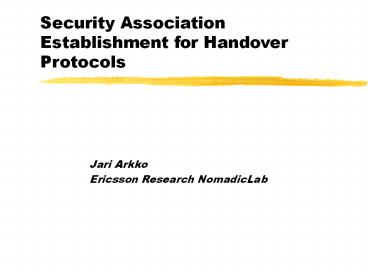Security Association Establishment for Handover Protocols - PowerPoint PPT Presentation
Title:
Security Association Establishment for Handover Protocols
Description:
Security Association Establishment ... Key derivation as side effect of network access AAA. For instance, branch off new key hierarchy from EAP reserved keys ... – PowerPoint PPT presentation
Number of Views:56
Avg rating:3.0/5.0
Title: Security Association Establishment for Handover Protocols
1
Security Association Establishment for Handover
Protocols
- Jari Arkko
- Ericsson Research NomadicLab
2
Outline
- Scope
- Problem
- Solutions
3
Scope -- Movements
4
Scope -- Movements
As it moves to a new place, the MN needs to talk
to (1) Access points
5
Scope -- Movements
As it moves to a new place, the MN needs to talk
to (1) Access points (2) AAA
6
Scope -- Movements
As it moves to a new place, the MN needs to talk
to (1) Access points (2) AAA (3) Access routers
7
Scope -- Movements
As it moves to a new place, the MN needs to talk
to (1) Access points (2) AAA (3) Access
routers (4) Possibly other routers
8
Scope - The Access Router
- The focus of this presentation is the
communication with the access router - Current general case is that no security is used
for this communication, plain forwarding/ND/ICMP
is just used - This does not hold for all protocols -- many
mobility protocols need a security association
between the MN and the AR - Examples Context Transfer, Fast Handover, CARD
- Different types of security associations are
needed in different cases
9
The Problem
- Current mobility protocols themselves do not
provide security association establishment - Configuration of pair-wise security associations
between all MNs and ARs is not practical - Reliance to a trusted 3rd party might not answer
to important authorization questions (e.g., can
this node request that stream to be moved
with FMIP?) - What are the options?
10
Options for SA establishment 1/2
- IKE?
- Issue 1 Shared key provisioning between MN and
an arbitrary visited network router - Issue 2 Authorization?
- Key derivation as side effect of network access
AAA - For instance, branch off new key hierarchy from
EAP reserved keys - Can be defined for network access purposes, needs
a new system-level security design draft in EAP
WG - Issue 1 may require a new node to be involved in
addition to the AAA and AP -- how to send keys to
that? - Issue 2 theoretical vs. practical availability
of an underlying AAA run -- e.g. likelihood of
UAM vs. 802.1X authentication -- though maybe not
an issue if you are doing fast movements (?)
11
Options for SA establishment 2/2
- Key derivation as side effect of network access
AAA contd - Issue 3 inter-admin handovers -- e.g. from my
home AR to the city AR, no roaming may be
involved if I just have two credentials - SEND-like solution?
- One-sided certificates for routers (SEND RS/RA
part) -- used in CARD - Issue certificate revokation checks?
- Address ownership (IPR may apply) -- used in
draft-kempf-mobopts-handover-key-00.txt - A single mechanism vs. allowing multiple?
12
Framework - Fundamentals
- Source of trust -- pairwise config vs. trusted
3rd party (CA or AAA) vs. intrinsic proofs such
as address ownership - Deployment -- need per mobile node configuration
or not? - Authorization -- what can you do with the AR?
13
Framework - Protocol Design Issues
- Reuse -- independent vs. reuse of security for
another purpose - Layering -- interaction with a lower layer vs.
independent - Using a branch of EAP AMSK vs. rerunning EAP
- Separation of SA establishment and use -- but
what about authorization? - Type of an SA?
- Likely application specific
- But ability to use MIPv6 BAD would often be
useful - Efficiency -- look at the messages and timing
of the whole flow
14
Tentative Proposal
- Rely on router certificates whenever possible
- Example CARD, SEND
- Manufacturing and configuring MNs is easy
- Worked well for the web
- Applicable when no trust for the MN is needed
- Use application specific security for MN if
really needed - Example draft-kempf-handover-key-00.txt
- May not need any configuration!
- Separate certs/ownership vs. use of this
- Better separation than assuming a kmgmt protocol
that provides a shared secret































